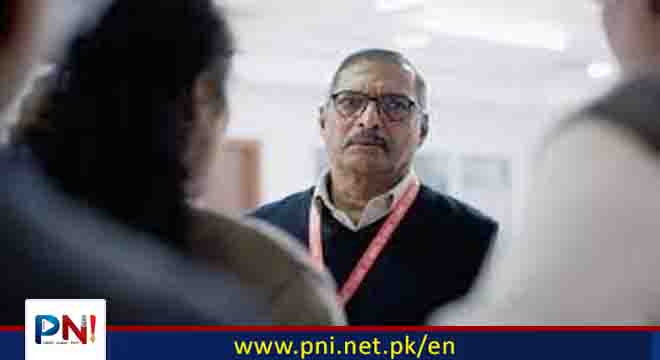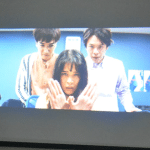Islamabad SEPTEMBER 28 (Online): The Vaccine War review: Vivek Agnihotri’s The Kashmir Files follow-up can get one-sided in parts but does a good job of representing the scientists’ struggles.
‘We can fight this war with science’. ‘This is not a bio war, this is info war’. ‘India can do it’. These are some of the phrases that we hear throughout The Vaccine War. Based on the book Going Viral by Prof Balram Bhargava, Director General, Indian Council of Medical Research (ICMR), this Vivek Ranjan Agnihotri directorial is an attempt to shift light from naysayers to celebrating the efforts of unsung heroes, frontline workers and relentless scientists who didn’t rest for months in a bid to create India’s indigenous COVID-19 vaccine, Covaxin. Agnihotri narrates the ordeal, struggle and eventual success of these women scientists who believed that India, too, can have its own vaccine and not rely on of foreign organizations.
The Vaccine War review: Nana Patekar plays a scientist in the film.
Parts of The Vaccine War try to acquaint us with the lives of scientists and some sequences will even remind you of Mission Mangal. And in other parts, the film attempts to erase the allegations that the government faced and used media as the scapegoat. Agnihotri doesn’t hesitate in highlighting the episodes when the central government faced massive flak for inadequately handling the pandemic that in turn led to loss of several human lives. Does it get preachy? Yes. Not in its dialogues maybe, but definitely in the undertone.
There’s a large sequence detailing the step-by-step making of Covaxin that was developed by Bharat Biotech in collaboration with ICMR and National Institute of Virology (NIV). Even when inside the science labs, Agnihotri doesn’t let go of the human emotions — excitement on a breakthrough, helplessness when results are delayed, anger when a senior puts pressure, tears when you empathize with fellow scientists who are tired after multiple sleepless nights. These small yet significant moments make this science film and humanist drama. Having said that, the film involves way too much science and terms used in laboratories, and it can be a bit too much to take in all at once in the first half. But once the stages of isolating the coronavirus and the process of developing the vaccines take over, things start to seem much simpler.
The narrative is ably supported by strong characters that are as real as it gets. The way Agnihotri puts light on the issues scientists faces — both in their laboratories and at home, moves you. The storytelling is simple and never too complicated. The dialogues are hard-hitting and impactful. Nana Patekar as Dr Balram Balram Bhargava and Pallavi Joshi as Dr. Priya Abraham, Director-NIV, are the soul of the film, and don’t miss a single chance to impress with their tremendous acts. You feel their pain, their joy, their angst and their pride.
From Patekar’s subtle body language to Joshi’s dialogue delivery, it’s a delight to watch these ace performances. Girija Oak Godbole as Dr. Nivedita Gupta, ICMR portrays her part beautifully and is nothing short of a soldier fighting on the war front. Nivedita Bhattacharya as Dr Pragya, NIV, is equally convincing trying to maintain a work-life balance with her share of ups and downs. Raima Sen as journalist Rohini Singh Dhulia has a powerful screen presence, and the grey shades of her character are highlighted cleverly.
A scene from The Vaccine War
At 2 hours 40 minutes, the film is a tad long for the story it sets out to show. The first half is dull especially when ICMR and NIV are trying to find a middle path to conduct various tests on the novel virus. The second half get better. Though it ends up being primarily a one-sided account where media is blamed for setting a negative narrative against the vaccine, it is also a sharp commentary on the system and its loopholes.
The Vaccine War also rides high on conspiracy theories which became a norm during the pandemic — could coronavirus be man-made in labs, could it be result of a lab leak, do pharma lobbies exist that don’t promote indigenous vaccines and focus on media trials that can turn truth into lies and vice versa, remains the core of the film. Through Raima Sen’s character, Agnihotri openly calls out Indian journalists who stood in way of India’s struggle to create their own vaccine. Without batting an eyelid, the film labels media as malicious with their vested interests. In fact, they are called more dangerous than the actual coronavirus and needs to be shut down soon.
The a press conference sequence and the subsequent speeches by Nana Patekar and Pallavi Joshi’s characters offer the perfect stage for a climax. That being said, there are several arguments from Agnihotri that do not hold any evidence, and looks like a lot of creative liberty is applied.
The Vaccine War is a must watch for its sole intention to tell us about the hardships, efforts and struggles of the medical and scientific communities. It may be triggering if you have lost someone close to this deadly virus, but it lets you appreciate that creating a vaccine in time saved several other lives. Try and go with an open-minded and not get worked up watching the portions where the film gets one-sided whether in favour of the government or against the media.
Follow the PNI Facebook page for the latest news and updates.









